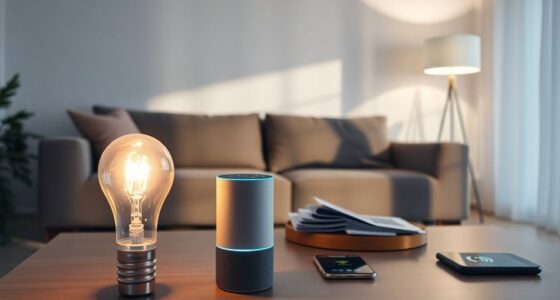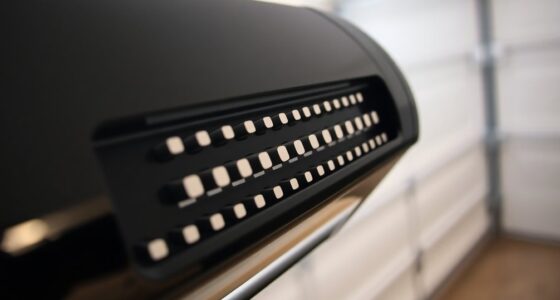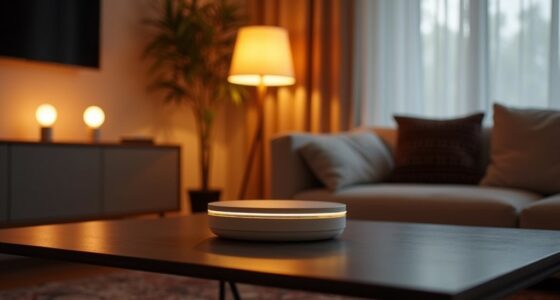The conclusion of smart home automation points to a future where your home adapts to your lifestyle seamlessly. With AI-driven systems enhancing convenience and energy efficiency, you'll find comfort in automation that anticipates your needs. The integration of smart devices allows for cohesive operation and real-time adjustments to improve your daily life. However, as this technology advances, security remains a concern, prompting ongoing innovations. Overall, smart homes promise to elevate living standards while promoting sustainability. There's much more ahead as technology evolves, and exploring these advancements can help you make informed decisions for your future home.
Key Takeaways
- Smart home automation will continue to evolve, integrating more devices and enhancing user convenience through AI-driven systems.
- Predictive capabilities and personalized features will optimize energy efficiency and improve user experiences in everyday tasks.
- Security innovations, such as biometric recognition and advanced threat detection, will address growing consumer concerns about smart home vulnerabilities.
- Sustainable practices, including smart energy management and the use of renewable sources, will play a crucial role in future smart home designs.
- The projected growth in interconnected devices will lead to more cohesive ecosystems, enhancing the overall functionality and automation of smart homes.
Overview of Smart Home Automation
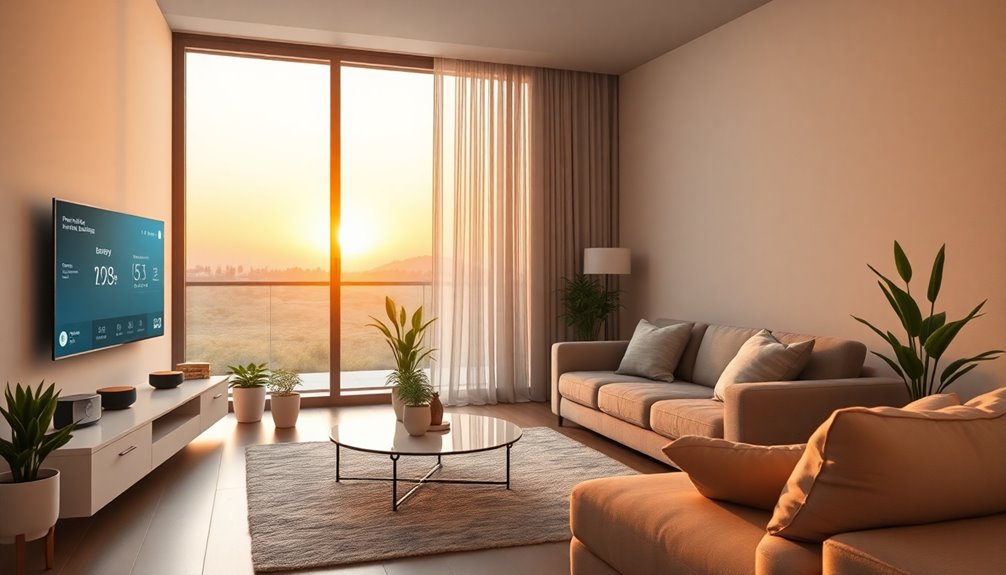
Smart home automation represents a revolutionary shift in how you interact with your living space. By integrating smart home devices and automation systems, you gain unprecedented control over your environment.
These AI-powered systems adapt to your habits, making daily tasks more convenient while promoting energy efficiency. Interconnected devices communicate seamlessly, ensuring that your home operates cohesively.
Enhanced security features, such as biometric authentication, provide peace of mind, allowing you to monitor your home remotely.
As technology evolves, customizable user interfaces are emerging, catering to your unique preferences and improving overall satisfaction.
With the rise of smart home automation, your living space transforms into a more sustainable and efficient environment, ultimately enhancing your quality of life.
Key Benefits of Smart Homes
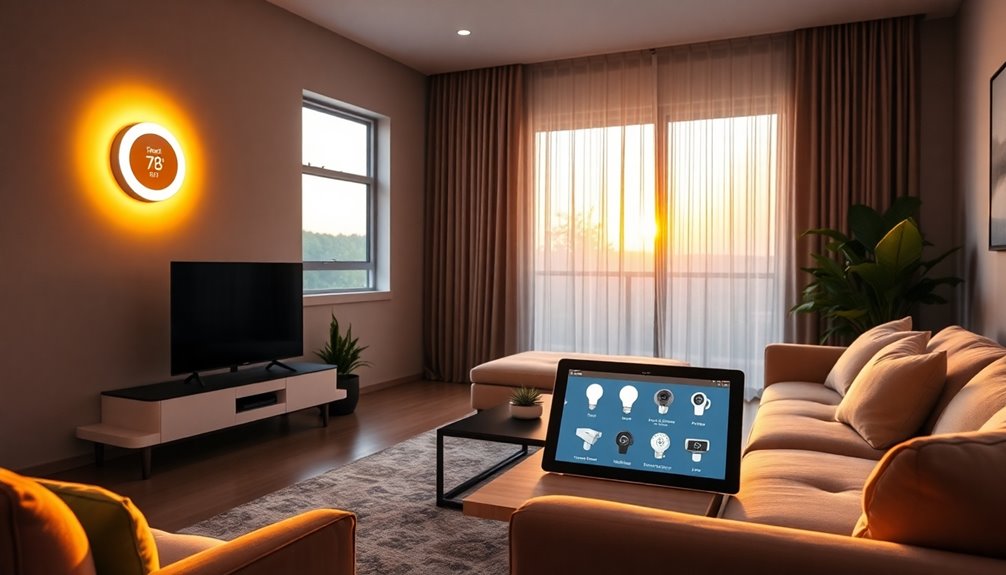
As you embrace home automation, you'll quickly discover a range of key benefits that transform your living experience.
Smart home technology elevates convenience and security while promoting health and well-being. Here are some advantages you'll enjoy:
- Convenience: Automate routine tasks like lighting and temperature control.
- Energy Efficiency: AI optimizes energy consumption, saving you money.
- Personalized Experiences: Tailor settings to your preferences for ambiance and comfort.
- Enhanced Security Systems: Benefit from real-time monitoring and AI-driven threat detection.
- Health-Centric Features: Enjoy air quality monitors and sleep optimization for a healthier home.
With these benefits, automation technology not only simplifies your life but also creates a safer and more comfortable environment.
Role of AI in Automation
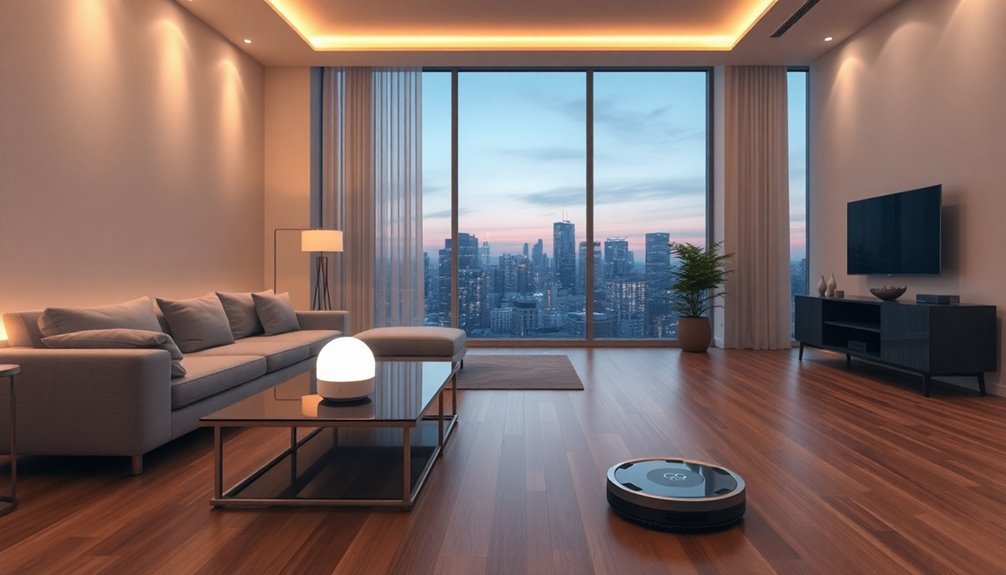
Home automation takes convenience to the next level through the integration of artificial intelligence (AI).
This AI integration allows smart home systems to learn and adapt to your habits, enhancing personalization. With predictive maintenance, these systems identify potential appliance issues before they cause problems, helping extend the lifespan of your devices.
You'll find voice-activated technology, favored by 70% of consumers, makes controlling your home systems seamless and intuitive.
AI-powered personalization optimizes features like lighting, temperature, and entertainment to suit your preferences.
As AI continues to advance, it will further boost the efficiency and capabilities of automation technologies, making your smart home experience even better. Additionally, AI automation enhances decision-making through data-driven insights, improving the overall functionality of smart home systems.
Embracing these innovations transforms your living space into a truly intelligent environment.
Energy Efficiency and Sustainability

When you embrace smart energy management, you're not just cutting costs; you're also reducing your carbon footprint.
Integrating renewable energy sources into your home can enhance sustainability and create a greener living space. Additionally, the adoption of solar energy solutions can significantly lower energy bills while contributing to a cleaner environment.
Smart Energy Management
Smart energy management systems revolutionize how you use electricity, allowing you to activate appliances during off-peak hours and greatly cut down on energy costs.
With AI-driven technology at your fingertips, you can embrace a sustainable lifestyle while enjoying significant savings.
Here are some benefits of smart energy management:
- Activate smart appliances during low-rate periods.
- Utilize advanced smart lighting that adjusts automatically.
- Make real-time adjustments to air quality and temperature.
- Reduce waste and enhance energy efficiency.
- Support sustainability efforts through responsible energy use.
Renewable Energy Integration
By integrating renewable energy sources into your home automation system, you can greatly enhance energy efficiency and sustainability. Smart energy management systems predict energy consumption patterns and switch to renewable energy when available, optimizing your energy usage. Incorporating smart appliances and energy-efficient devices can cut your overall energy consumption by up to 30%. Advanced energy monitoring tools provide real-time data, helping you make informed decisions. Energy efficiency ratings help identify which improvements will have the most significant impact on your energy consumption.
| Feature | Benefits |
|---|---|
| Renewable Energy Sources | Reduces reliance on traditional energy |
| Smart Appliances | Decreases overall energy usage |
| Energy Management Systems | Promotes sustainability |
This combination leads to lower energy costs and a more sustainable living environment, making your home automation truly future-ready.
Reduced Carbon Footprint
As you embrace smart home technology, you're not just enhancing convenience; you're also taking significant steps toward reducing your carbon footprint.
These smart home technologies promote energy efficiency and sustainable living in various ways:
- Regulate appliance usage during off-peak hours, cutting energy consumption by 10-30% annually.
- Integrate renewable energy sources, like solar panels, to minimize fossil fuel reliance.
- Utilize energy-efficient appliances with smart features to decrease power usage.
- Implement automated systems for irrigation and water management to reduce waste.
- Manage energy consumption effectively, potentially lowering it by up to 20%.
- Moreover, the integration of heat pumps into smart home systems can further enhance energy efficiency by utilizing renewable energy sources for heating and cooling.
Security Challenges and Solutions

While the convenience of smart home automation offers numerous benefits, it also introduces significant security challenges that homeowners must navigate.
With 60% of consumers prioritizing security features, implementing robust security systems is essential. Biometric recognition and behavioral systems enhance accuracy by replacing traditional passwords, making your home safer and more convenient.
AI integration provides advanced threat detection, allowing for real-time alerts when unusual behavior occurs. However, investing in cybersecurity is vital to protect against potential hacking and data breaches.
Remote access capabilities empower you to monitor and control your security systems from anywhere, ensuring peace of mind.
Future Technological Innovations
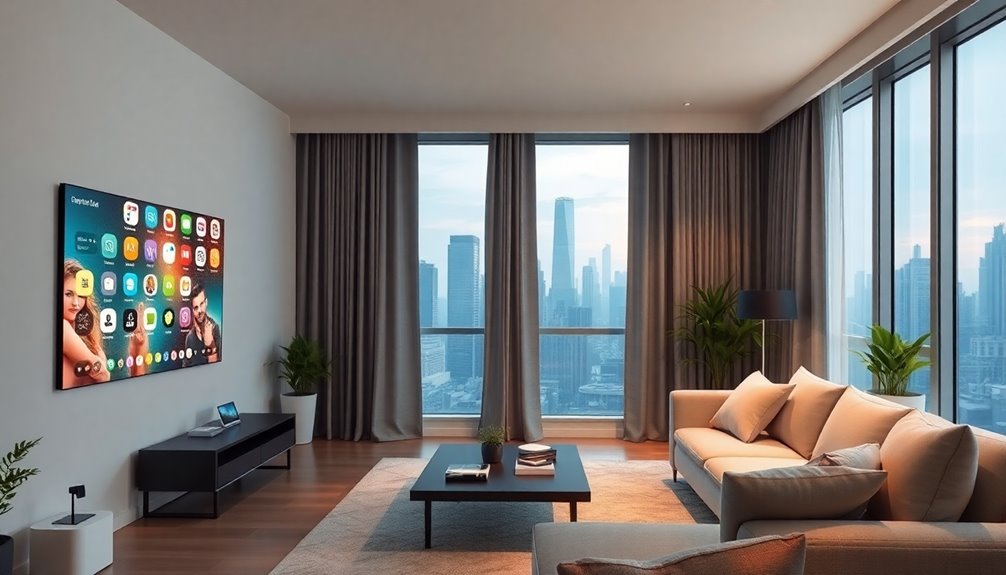
As you look ahead, AI-powered automation will transform your home into a more intuitive space that learns your habits.
Enhanced device connectivity will make it easier for all your smart gadgets to work together seamlessly.
Plus, innovations in smart security will guarantee that your home remains safe and secure, adapting to new threats in real-time.
AI-Powered Automation Advancements
The future of smart home automation is set to be revolutionized by AI-powered advancements that promise to enhance your living experience.
You'll enjoy greater convenience and efficiency as these innovations unfold, including:
- Predictive automation that learns your routines to optimize energy use.
- Advanced voice assistants with improved natural language processing for smoother interactions.
- Machine learning algorithms that refine AI capabilities for more accurate predictions.
- Unified ecosystems where smart devices coordinate seamlessly, enhancing automation.
- Health monitoring features that track environmental factors and personal metrics to promote well-being.
These advancements in control systems and AI will transform how you manage your home, creating a more intuitive and health-conscious environment tailored just for you. Furthermore, the integration of AI technologies in smart home devices will lead to personalized user experiences that cater to individual preferences and needs.
Enhanced Device Connectivity
With the rapid evolution of technology, enhanced device connectivity is poised to redefine the smart home landscape. By 2025, you're likely to see around 75 billion smart devices, all working together seamlessly. The implementation of 5G technology will elevate device interactions, making them faster and more reliable. Platforms like Apple HomeKit and Google Home will improve interoperability, allowing unified control over your connected devices. Enhanced Internet of Things (IoT) integration will enable sophisticated communication between appliances, lighting, and security systems, making your home smarter than ever. Future smart homes will focus on user-friendly interfaces, simplifying your experience in managing these interconnected devices.
| Feature | Current State | Future Development |
|---|---|---|
| Device Count | 10 billion | 75 billion by 2025 |
| Connection Speed | 4G | 5G and beyond |
| Control Platforms | Fragmented | Unified systems |
Smart Security Innovations
While you might already enjoy basic security features in your smart home, innovations on the horizon promise to elevate your safety and peace of mind.
The future of smart security innovations includes:
- AI-driven monitoring systems that enhance threat detection.
- Facial recognition technology boosting accuracy in identifying intruders.
- Remote access capabilities for real-time surveillance from anywhere.
- Smart locks and doorbells projected to grow by 30% annually.
- Cybersecurity measures to protect against hacking and data breaches.
These advancements not only improve your home's safety but also provide you with the flexibility and control you need.
As these technologies evolve, you can expect a smarter, more secure living environment that truly offers peace of mind.
Integration of Smart Devices

As smart home technology evolves, integrating devices becomes increasingly essential for enhancing your living experience. The integration of smart devices is projected to reach 75 billion by 2025, promising improved connectivity and energy optimization. Platforms like Apple HomeKit and Google Home enable seamless integration, allowing for efficient control and management of various systems.
| Device Type | Benefits | AI Integration |
|---|---|---|
| Smart Thermostats | Energy savings | Learning user habits |
| Smart Lights | Enhanced ambiance | Automation based on activity |
| Smart Security | Increased safety | Real-time monitoring |
With improved internet reliability and AI's ability to adapt, your home automation promises a more streamlined and user-friendly experience. Embrace these advancements for a smarter future. Additionally, utilizing energy-efficient models in your smart home design can significantly reduce electricity costs and enhance overall sustainability.
User Experience and Accessibility

Integrating smart devices into your home not only enhances functionality but also improves user experience and accessibility.
With a focus on user-friendly interfaces and AI, these systems cater to everyone, regardless of age or tech-savviness. Here's how:
- Voice commands simplify interactions, with 70% of users preferring this method.
- Intuitive design promotes seamless navigation through centralized hubs or apps.
- AI and machine learning customize settings to fit your preferences, enhancing satisfaction.
- Automation systems guarantee that managing home components is effortless.
- Continuous advancements in connectivity make smart technology more inclusive.
As a result, you can enjoy a more accessible and engaging environment tailored to your needs.
Embracing these innovations means a better quality of life at home.
The Path Forward for Smart Homes

The future of smart homes promises to revolutionize how you interact with your living space, making it more intuitive and personalized. As technology advances, smart homes will integrate AI, learning your preferences to enhance convenience and efficiency.
By 2025, the market will boast around 75 billion interconnected devices, making interoperability essential for seamless functionality. Security systems will become more advanced, incorporating AI-driven monitoring and biometric authentication to alleviate privacy concerns.
Meanwhile, a focus on energy efficiency will lead to appliances that optimize usage and reduce carbon footprints. With the rollout of 5G, you'll experience faster response times, ensuring that all your smart devices communicate effortlessly.
The path ahead is bright, paving the way for smarter, safer, and more sustainable living environments.
Frequently Asked Questions
What Is the Conclusion of Smart Home Automation?
Smart home automation's conclusion revolves around its potential to transform your living experience.
You'll enjoy enhanced convenience, efficiency, and security as these systems adapt to your habits.
With the rise of smart devices, interoperability becomes vital, allowing seamless integration.
Innovations in sustainability will lower energy consumption, benefiting the environment.
Ultimately, user-friendly designs will guarantee everyone in your household can easily navigate these technologies, making smart homes an essential part of modern living.
What Is the Future of Smart Home Automation?
The future of smart home automation looks promising for you. By 2025, you'll likely see 75 billion smart devices enhancing your daily life.
AI will help your home learn your preferences, making it more intuitive. Interoperable platforms like Apple HomeKit and Google Home will guarantee your devices communicate seamlessly.
You'll enjoy energy-efficient systems that promote sustainability and advanced security features, like biometric recognition, giving you peace of mind while enhancing convenience.
What Does the Future of Smart Homes Look Like?
Imagine waking up in a home that knows your preferences better than you do.
The future of smart homes is set to amaze you with interconnected devices, AI learning your habits, and enhanced security features that keep you safe.
You'll enjoy energy-efficient living while effortlessly managing everything with your voice.
As renewable energy integrates seamlessly into your routines, your home won't only adapt but elevate your daily life to new, sustainable heights.
What Is the Main Objective of Home Automation?
The main objective of home automation is to enhance your convenience by letting you control devices and systems remotely.
It aims to improve energy efficiency, reducing your costs by optimizing energy use based on real-time data.
Security is another key goal, with smart locks and cameras ensuring your safety.
Plus, home automation personalizes your living environment, adapting settings like temperature and lighting to fit your preferences, while promoting sustainability with energy-efficient appliances.
Conclusion
To sum up, smart home automation is shaping a more connected, efficient, and secure future for all of us. With advancements in AI and energy efficiency, these systems aren't just conveniences; they're essential for modern living. As you consider the potential of smart technology in your life, think about this: how much easier could your daily routine become with the right automation? Embracing these innovations can lead to a more sustainable and enjoyable lifestyle for you and your family.


